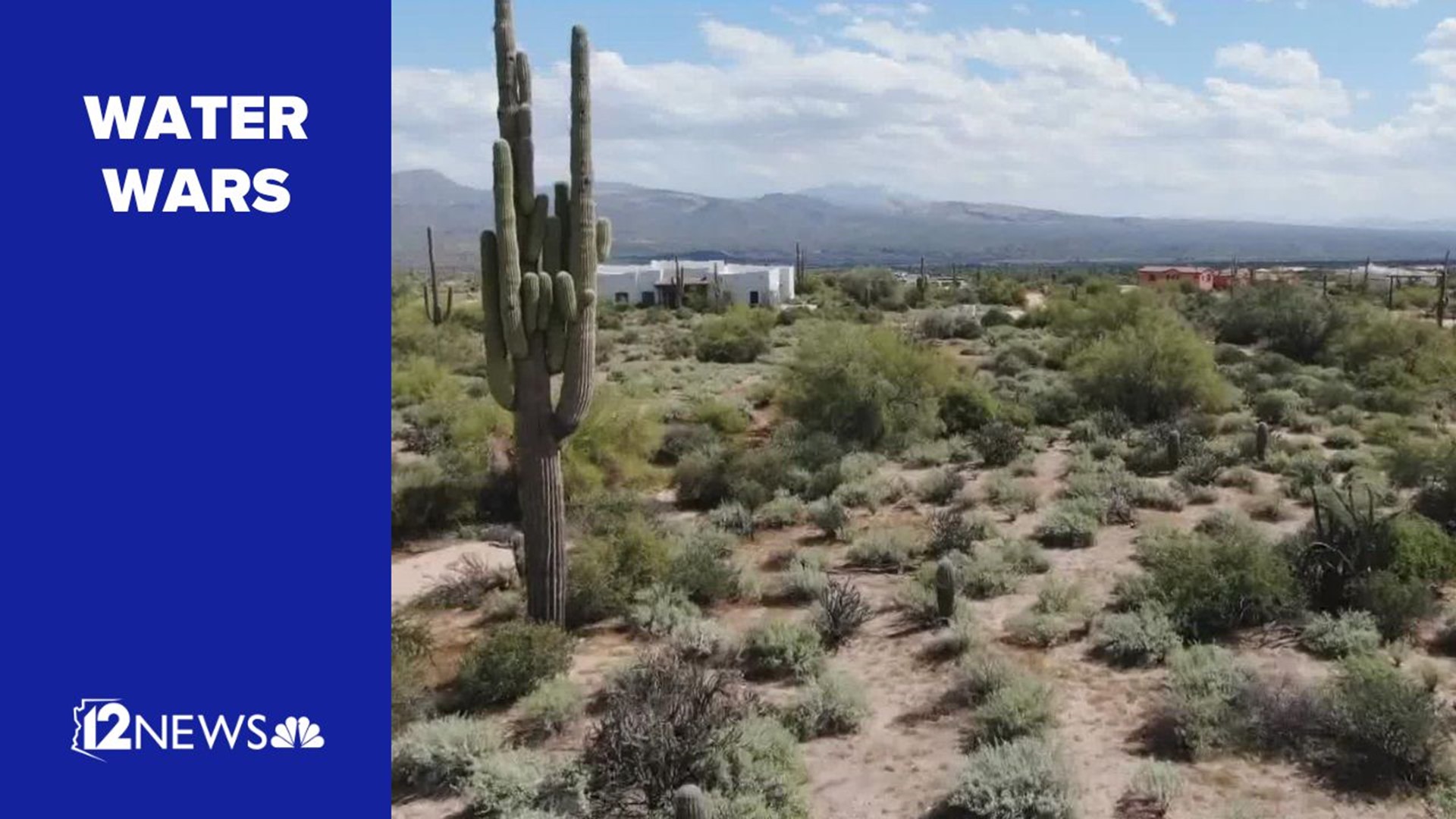SCOTTSDALE, Ariz. — Residents of an East Valley rural community have been dealing with an impending water crisis for nearly a year.
Last November, the city of Scottsdale sent a letter to residents of Rio Verde Foothills letting them know water hauling services, the main way hundreds of the rural area's homes get water, would be cut off at year's end as a part of Scottsdale's drought contingency plan.
Approaching the letter's anniversary, the community's seemingly only solution promises a water price spike, exclusivity, and a years-long timeline before water flows again.
EPCOR, a Canada-based water utility company, has essentially had the way paved for it to be Rio Verde Foothills' primary water provider after the Maricopa County Board of Supervisors voted against a divisive plan to form a citizen-led water board in the area.
PREVIOUS COVERAGE: 100s of homeowners in an upscale desert community north of Scottsdale will lose their water supplier in 3 months. What's next is unclear
The utility company recently sent an application to Arizona's Corporation Commission (ACC) outlining its plan to provide a water standpipe service to the community, including multiple hurdles it and the community's residents would have to surpass before water service is set up.
2 to 3 years before the standpipe is set up
The first hurdle is how long it will take after the Jan. 1 cutoff to get water back to the area.
EPCOR said numerous things need to happen before water can reflow, including
- Find and acquire land to construct the standpipe on
- Get separate water rights from Rio Verde Utilities Inc., which serves customers in Rio Verde but not Rio Verde Foothills
- Drill a new well to supply the standpipe
- Build other infrastructure for the standpipe
These hurdles are the reason why the utility company says it may take longer than two to three years after the ACC approves EPCOR's plan for the standpipe to be operational.
"While EPCOR has the means and expertise to provide standpipe water service, it is doing so only to the extent there appears to be no other solution available," the company's application said.
A 'substantial increase' in residents' water prices
The planning, construction and operation of the standpipe won't be cheap, and the utility says residents will feel the costs of the burden.
The water rate at the standpipe would be $20 per 1,000 gallons of water, a "substantial increase" from what Foothills residents currently pay, according to the application.
For reference, the average Scottsdale resident pays $1.65 per 1,000 gallons and the average Glendale resident pays $0.33 per 1,000 gallons.
"The costs to supply standpipe service to the Foothills will be substantial and result in significantly higher rates than what is currently in effect for standpipe service from EPCOR’s Desert Hills / New River water station," the utility said.
EPCOR's New River standpipe is one of the reasons why the utility company was considered to solve Rio Verde Foothills' issue. New River was in a similar situation back in 2017 when Phoenix cut off water hauling services to its residents.
But, the Foothills situation is much different. EPCOR may have to build an entirely new well, along with the infrastructure needed to operate it, which is more construction than was needed in New River. The price for this construction could reach $10 to $12 million, and a more exact cost can't be known until the utility finds and approves a site for the standpipe.
No water for new homes constructed after 2023
There are 47 homes on the market in Rio Verde Foothills that list "hauled water" as their primary water source at the time of writing this article. A drive through the area also shows new homes still being built.
Construction may drastically dip in the coming years due to one of EPCOR's other caveats.
"EPCOR is seeking to provide water standpipe service to only those residents in the area identified as 'Rio Verde Foothills'...and only for homes that are built as of January 1, 2024," the company's application said.
The initial letter from Scottsdale announcing the water cut-off came as a surprise to numerous residents. However, people continued to buy homes and move to the area without the knowledge of the cut-off, only learning later from neighbors about what they just signed onto.
Numerous loopholes in Arizona real estate law allow homes to be sold in unincorporated communities without guaranteed access to water. Additionally, there is no specific state requirement that mandates real estate salespeople to disclose impending water cutoffs to potential buyers.
READ THE FULL STORY: Hundreds of homes in Rio Verde Foothills are about to lose water; they won't be the last
This specific requirement from EPCOR looks to try and stop these practices from continuing, while making sure the area's aquifer is not further depleted.
The utility's plan has yet to be approved by the ACC, but even after approval happens, residents of the Foothills still have a long way to go before a guaranteed source of water is secured.
See the full application here:
Water Wars
Water levels are dwindling across the Southwest as the megadrought continues. Here's how Arizona and local communities are being affected.

